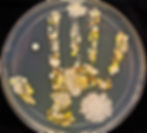Our world without bacteria
- SATNAVmagazine
- Mar 1, 2019
- 2 min read
A thought experiment: imagining a world in which bacteria suddenly cease to exist
By Phoebe Buxton

It is hard to imagine that we share this planet with billions of species of bacteria, with trillions inhabiting our bodies this very second. The world of these single-celled, microscopic organisms seems inconceivable to us, but what would our world be like without them?
Bacteria: dirt; disease; danger. These are words that quite likely enter the mind in discussion of these omnipresent microorganisms. We may think that, on the surface, a life without bacteria means a life without infectious disease and, in part, this is correct. The majority of infectious diseases are caused by bacteria; if all bacteria disappeared, these would cease to exist, saving the lives of many. But this would not last long. Both pathogenic and harmless bacteria have a vital role in defence against potentially more harmful infections. Bacteria share their microscopic world with other organisms, including archaea, protozoa and fungi, as well as viruses, many of which are pathogenic. Although the immediate effect may appear beneficial, cases of viral infectious disease would soon rise, potentially opening the doors to an increased number of infections with potentially more harmful outcomes.
The mutualistic relationship between bacteria and humans, as well as between bacteria and most other organisms, is essential for numerous bodily functions. For humans and many vertebrates, the microbiome is an imperative component of the digestive system. From the mouth to the gut, a plethora of specific enzymes produced by resident bacteria aid the breakdown of complex molecules. This helps to provide a sufficient level of essential vitamins and minerals that could not be achieved solely from the diet. Thus, despite the complexity of vertebrate physiology, it cannot suffice without bacteria. Although the immediate effects may not be catastrophic for humans, a sterile body would lead to a quick death for many organisms, mainly due to insufficient immune responses. Furthermore, the extinction of crops and livestock would cause huge disruption to food chains and ecosystems, leading to the gradual extinction of both plants and animals.
The sun, plants and chemical elements are widely recognised as playing an important role in the existence of life on Earth. However, less acknowledged is the crucial role of bacteria. Through complex cycles, these seemingly simple organisms form the building blocks for life; maintaining levels of nutrients such as phosphorus, carbon and nitrogen, which form essential components of DNA, proteins and thus life. Due to a lack of nutrient cycling by bacteria, decreased cycling of nitrogen would lead to plant death and ecosystem disruption, whilst a lack of bacterial decomposers would lead to excessive waste accumulation and accelerated global warming.
In a nutshell, bacteria are essential for sustaining life as we know it. However, if all bacteria were to disappear this second, effects are likely to take time. Existing pools of essential compounds are likely to sustain our environment, and human intelligence may result in temporary measures. However, a catastrophic cascade of events, disrupting biological functions, would eventually make our planet an uninhabitable wasteland. The result: an unrecognisable world.
From Issue 17
_edited_edited.jpg)


